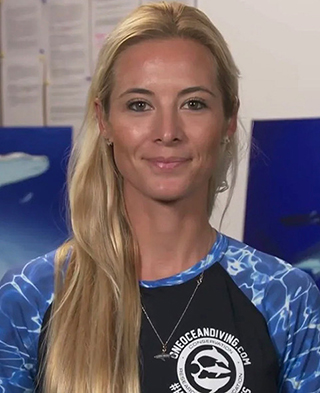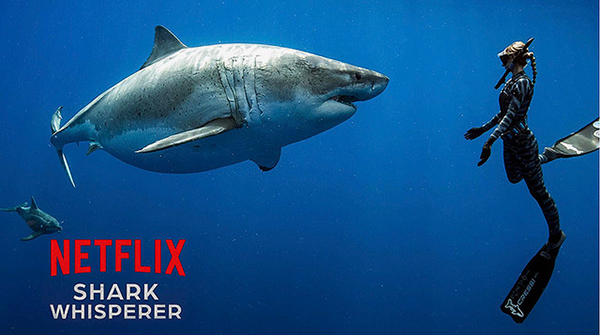A Circus Shark Tamer or Conservationist?Contents of this Issue: Lankayan Island Beach Resort, Malaysia Is Restoring Reefs a Waste of Effort? Your Reports Are Most Important A Circus Shark Tamer or Conservationist? A Free Ascent - the Last Resort? Part Il A Reason Not to Practice Free Ascents Not Yet Plain Sailing for the SS United States Editorial Office: Ben Davison Publisher and Editor Undercurrent 3020 Bridgeway, Suite 102 Sausalito, CA 94965 the Shark Whisperer causes controversy from the September, 2025 issue of Undercurrent
David Shiffman, a board member of the American Elasmobranch Society, wrote in a July 2 blog entitled, "What Ocean Ramsey Does is Not Shark Science or Conservation." He called her a "serial wildlife harasser who also coordinates massive online harassment campaigns against scientists and conservationists who criticize her. Ocean Ramsey claims to be a shark scientist, but is not." He added, "I've never gotten more or nastier harassment than when I criticized her pseudoscientific nonsense," and even alleges he received death threats from her supporters. We now live in the age of "influencers." Thanks to YouTube, Instagram, and other digital platforms, people can attract huge audiences simply based on their own good looks and dispense their opinions about products and activities. No doubt, a video-on-demand service like Netflix, with a vast appetite for content, scours these new platforms to search for material to create documentaries. A slim and attractive young woman with long blonde hair who swims with sharks is obviously a seductive subject. Ocean Ramsey, who lives on Oahu, fills the bill perfectly. Even her name (it really is her name) is box-office material. So, it was inevitable they would be drawn to her as a subject. When a dead whale carcass, nine miles off the coast of Oahu, attracted feeding tiger sharks, Ramsey was there to swim and get photographed with them. Then, when a massive Great White turned up, belly swollen with the whale meat it had gorged on and could hardly move through the water, Ramsey's fame was set. The images of the vulnerable-looking young woman next to the massive apex predator went viral, and it probably wasn't long before the Netflix producers were on the case. The Netflix producers knew they were on to something akin to their previous success with Tiger King. They claimed she was unusual because she was free-diving with sharks. Attempting to honor dramatic marine life, she was portrayed as controlling the sharks in the manner of a circus lion tamer. Hence the controversy. The producers portrayed their Shark Whisperer as a scientist, a conservationist, and a politically active advocate for shark conservation. She came across very well when interviewed for the camera and was remarkably photogenic in her wetsuit, with her long blonde hair tied in a braid.
While the general public viewed her actions with admiration, many shark scientists and some people in the diving community took offense. Brittany Adkison, scion of a shark diving family, said, "Shark Whisperers are a dime a dozen now. Anyone can be a scientist and a specialist in front of a camera, including glorified Instagram influencers who seem to dictate most anything these days. Hopefully, one day we will get the eye candy with brains who can promote the right kind of education and not just look pretty with a shark." People have been diving with great whites long before Ocean Ramsey, but there will always be a new generation to replace those who went before. During the mid-1990s, rugged-looking Mike Rutzen, Mark Addison, and Andre Hartman free-dived with the Great White sharks of Gansbaai, South Africa. Many documentaries have been made, including the 2007 production "Sharkman" Hartmann was filmed free-diving with a great white shark, holding on to its dorsal fin, along with Jean Michel, in one of Cousteau's documentaries. The BBC considered equipping a boat specifically to take Rutzen to all the world's best shark diving locations and make him an international natural history star, but a horrific car crash in 2016, in Mozambique, brought his shark movie ambitions to an end. They weren't scientists either, but they exposed the public to the private lives of great whites, even though program producers liked to sensationalize the danger they posed to increase their audiences. In the meantime, many serious natural history scientists work diligently, if often anonymously, in the background, conducting serious research into sharks and publishing papers on their discoveries. Some who dived with Hartman, Addison, or Rutzen in South Africa, or were aware of their activities with sharks, also thought Ramsey was fraudulent in usurping the reputation of those who had free-dived with Great Whites before. Regardless of the activity, it's not uncommon for older generations to dismiss the achievements of newcomers. But is Ramsey, the new kid on the block, a fraud? Accredited marine biologist and shark scientist Kristian Parton says he could find no record of Ocean Ramsey's claim to be a legitimate ethologist and marine biologist. But, more important to Parton, does a person touching a shark damage it? "When an animal is stressed in its environment, it naturally produces glucocorticosteroids, a class of steroid hormones that play a crucial role in regulating various bodily functions, particularly inflammation and the immune response, and is part of the fight-or-flight reaction. Repeated production can even damage the brain. When an animal is repeatedly stressed, we have no idea of what stress hormones are doing under the surface." A 2025 study on rig sharks observed them making clicking noises when handled, interpreted as a stress or startle response. These sounds disappeared once the sharks acclimated. Leopard shark studies in managed care found that even controlled restraint caused measurable stress (increased lactate, blood gas changes), showing that physical touch alters shark physiology. Shark experts advise: "Never touch, corner, or harass a shark. Sharks can get stressed or feel threatened and defend themselves." "Tonic Immobility," often used by divers in conservation work to remove old fishing hooks, could lead to a misleading response interpretation: Flipping a shark or rubbing certain areas can induce a trance-like state, but scientists interpret this not as calmness but as a stress-induced defensive reflex. "So harassing wildlife by touching it is a big no-no. The ethics become questionable," Parton said. "That particular giant Great White had eaten itself into a food coma and showed zero interest in Ocean Ramsey. Although the photos imply she was alone with the shark, videos made at the time reveal a ton of people surrounding the shark from all sides. [It was a chaos of divers.] Hawaiian authorities had to warn people afterwards, not to swim near the floating whale carcass because it would have been so dangerous." That said, is what she does harmful to sharks in general? A production such as this, revealing a young woman with her hands on the most feared character from JAWS, probably does more to promote the preservation of sharks and assuage the fears of people who swim in the ocean than the mass of shark research and science that has resulted in a paper published in serious magazines such as Nature. Pete Atkinson, a long-time adventurer and diver, wrote from Thailand, "Ramsey will probably have a bigger impact on the survival of sharks than any marine zoologist." He may have a valid point. Howard Rosenstein, a diving pioneer who spearheaded a campaign to stop shark fishing in the Red Sea, said, "The message that sharks need to be protected is important and reaches far more of the public than any scientific paper." On her website, Ramsey says her mission is "to share information to educate and inspire others to help sharks gain protection worldwide." It appears she does not offer any paid social media content through subscription platforms like Patreon or OnlyFans, nor does she seem to run paid advertisements on her personal social media -- at least, no public evidence supports that. So, she is not monetizing her social media presence, though she is estimated to have as many as two million views. It doesn't appear she is in it for the money. So, the controversy remains. If you haven't watched Shark Whisperer, it's an uplifting documentary with emotional weight and gorgeous visuals. The Netflix production is well worth watching. But ask yourself the questions. Is what Ocean Ramsey is doing harmful to the sharks? Is she using the sharks to her own end? Watch the production and tell us what you think. Write to BenDDavison@undercurrent.org, not forgetting to add your name, town, and state. John Bantin *** We Need Your Opinion. *** |

I want to get all the stories! Tell me how I can become an Undercurrent Online Member and get online access to all the articles of Undercurrent as well as thousands of first hand reports on dive operations world-wide
| Home | Online Members Area | My Account |
Login
|
Join
|
| Travel Index |
Dive Resort & Liveaboard Reviews
|
Featured Reports
|
Recent
Issues
|
Back Issues
|
|
Dive Gear
Index
|
Health/Safety Index
|
Environment & Misc.
Index
|
Seasonal Planner
|
Blogs
|
Free Articles
|
Book Picks
|
News
|
|
Special Offers
|
RSS
|
FAQ
|
About Us
|
Contact Us
|
Links
|
3020 Bridgeway, Ste 102, Sausalito, Ca 94965
All rights reserved.

 Undercurrent reviewed the Netflix documentary "Shark Whisperer," featuring Ocean Ramsey, in July. Since then, the production has caused a furor among shark scientists, as well as the shark diving community.
Undercurrent reviewed the Netflix documentary "Shark Whisperer," featuring Ocean Ramsey, in July. Since then, the production has caused a furor among shark scientists, as well as the shark diving community.
